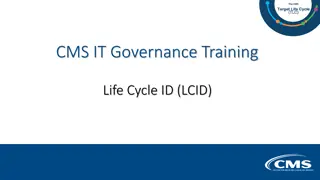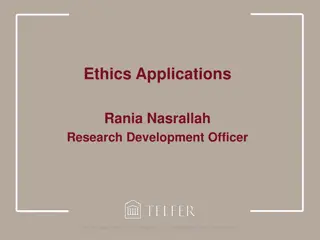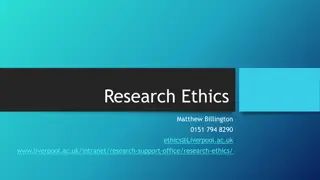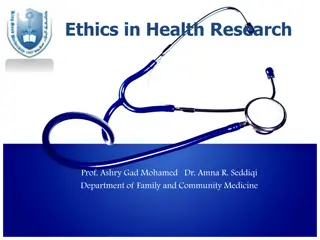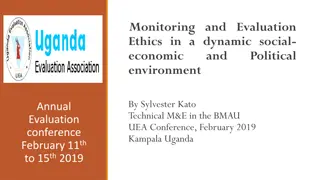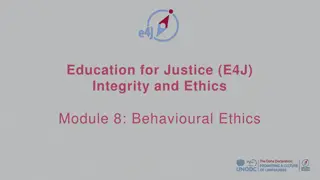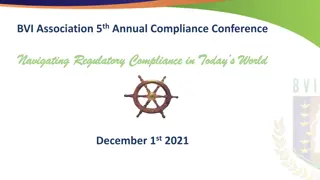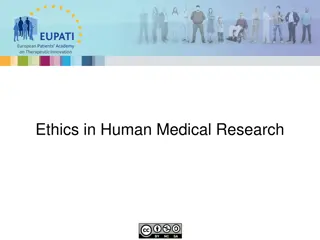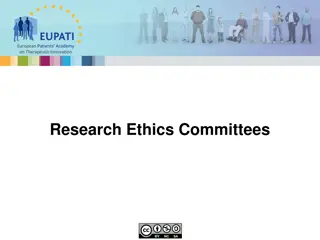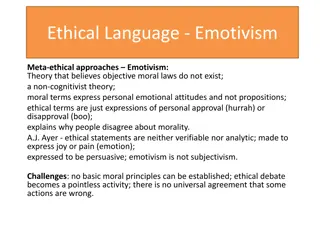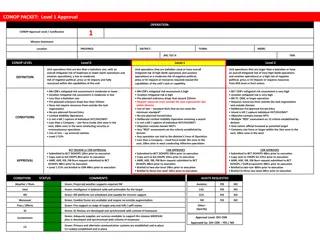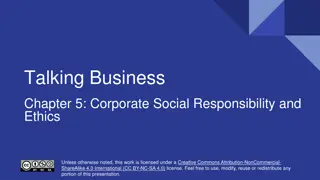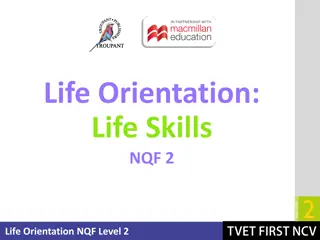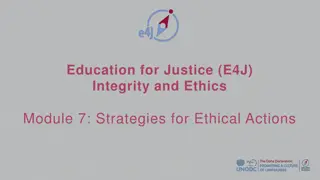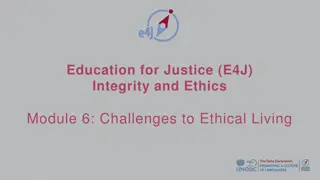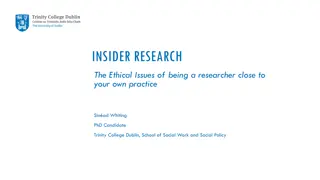Ensuring Ethical Approval in Research Governance
Research ethics are crucial in maintaining integrity in research projects. All researchers must obtain ethical approval, following robust processes to protect interests and ensure safety. Applications for approval should be submitted through Ethics Monitor with attention to detail and timely submission.
Download Presentation

Please find below an Image/Link to download the presentation.
The content on the website is provided AS IS for your information and personal use only. It may not be sold, licensed, or shared on other websites without obtaining consent from the author. Download presentation by click this link. If you encounter any issues during the download, it is possible that the publisher has removed the file from their server.
E N D
Presentation Transcript
Research Governance and the Ethical Approval Processes Kevern Verney, AHREC Chair Thursday 8 December 2022
Key Principles in Research Ethics (1) All research projects must receive ethical approval. The process of ethical scrutiny begins with individual researchers who are responsible for ensuring that their research projects receive ethical approval. Researchers in the University are expected to abide by the highest standards of integrity, openness and transparency at all times. Undertaking research projects without ethical approval is viewed with the utmost seriousness. Such breaches are subject to stringent penalties being imposed by the University including a requirement for the destruction of all data collected and, in the most severe cases, dismissal for members of staff and/or de-registration for PGRs. Guidance on ethical issues is provided by the University Research Ethics Policy available on the Research wiki: Research Ethics Policy - Edge Hill University
Key Principles in Research Ethics (2) Robust processes of ethical scrutiny are vital to protect the financial, legal and reputational interests of the University and also to ensure the safety and well-being of researchers and the living subjects or environments involved in their research. These include human beings, animals, plants, heritage sites and cultural or religious artefacts. It is recognized that some research participants, for example young people, students, or the elderly, may be particularly vulnerable and researchers are required to abide by university guidelines, available on the research wiki, when undertaking research with such groups: Ethics-Guidance-Children-_Young-People-RO-GOV-103.docx (live.com) Ethics-Guidance-Vulnerable-Adults-RO-GOV-113.docx (live.com) ethics-guidance-ehu-students.docx (live.com)
Submitting Applications for Ethical Approval All applications for ethical approval must be submitted on Ethics Monitor. The submission deadline is 23.59 on the first day of each month. Ethics Monitor can be accessed from the logo on the left or the link provided on the Research Wiki which also provides guidance on submitting applications for ethical approval : Ethics Monitor - Research - Edge Hill University Wiki
Good Practice in Submitting Applications for Ethical Approval Make sure that applications are submitted well in advance. Allow at least two to three months for the process of securing ethical approval. Applications should be written clearly and, where possible, avoid the use of over technical or specialized language. Applications should include all relevant supporting documentation copies of Participant Information Sheets, Consent Forms, proposed questionnaires. Applications should be concise and demonstrate that applicants have thought carefully about any ethical concerns that may arise and how these can be addressed or mitigated.
The Ethical Approval Process (1) Applications need to be reviewed and forwarded on by your PhD supervisor and Head of Department before the monthly submission deadline. They are then considered by one of the five Subject Research Ethics Committees (SRECs): Arts and Humanities (AHREC) Education (EREC) Health-related (HREC) Science (ScREC) Social Sciences (SSREC)
The Ethical Approval Process (2) The SREC Chair and Secretary will assign two lead reviewers for an ethics application. The reviewers will usually, but not always, be other members of the SREC. Applications with little or no ethical concerns or issues can be given expedited approval. Other applications will go to the full membership of the SREC for consideration either online or in meetings of the SREC.
Why do applications with little or no ethical risks/concerns need to be submitted for ethical approval?
Why All Research Projects Require Ethical Approval The University needs to have a record of all research projects being undertaken in case of internal/external review. Individual researchers should not decide whether or not their projects have ethical issues/concerns. They need to be assessed by independent peer reviewers. Even for desk bound projects there can be ethical risks. For example downloading material from the internet or use of social media. For PGRs/early career researchers knowledge and understanding of the research ethics approval process is an essential part of their training as scholarly researchers. This includes submitting an application for ethical approval for their research. Projects that are low risk can be given expedited approval by the SRECs. So the process doesn t have to be burdensome for applicants.
What do SRECs look for in ethics applications? Do SRECs consider the quality of the research proposal?
Conflicts of Interests/Poor Practice Since the 1950s tobacco companies have consistently funded research designed to cast doubt on the harmful effects of smoking. Research projects where the methodology is sufficiently flawed to cast doubt on the value of any findings that might be obtained can be seen as an unethical use of time, money and resources.
Participant Information Sheets/Consent Forms These should be provided to participants as two separate documents. The Participant Information Sheet should provide a brief explanation of the project in language that can be understood by non-specialized readers and that also takes into account the age/reading ability of the participants. Participants must be advised of the commitment they will be expected to make to the project and of any risks involved. If participants might experience physical or emotional distress as a result of their involvement in the project they should be provided with contact details for appropriate counselling and support. Participants must be informed how data collected from the project will be used and stored. Participants must be advised of their right to withdraw from the project. The Participant Information Sheet must provide contact details for the researcher and also an independent third party in case participants have any ethical concerns they wish to raise about the research. A template for Participant Information Sheets is available on the Research wiki: Governance - Participant Information Sheet template - RO-GOV-17.docx (live.com)
Project Information Sheets and Readability In his 2017 farewell address, President Obama reflected that in 2008 his election had prompted talk of a post-racial America . Media commentators saw his victory as evidence that the nation s long, troubled, history of race relations had finally been overcome. For a lot of younger African-Americans, the resistance of the civil rights generation to Obama s candidacy signified the failure of their parents to come to terms, at the dusk of their lives, with the success of their own struggle , observed journalist Matt Bai. They were unable to embrace the idea that black politics might now be disappearing into American politics in the same way that the Irish and Italian machines long ago joined the political mainstream . This perception was reinforced by demographic change, with a 2008 report by the United States Census Bureau forecasting that by 2042 white Americans would make up less than 50 per cent of the population.
Barack Obama for Children Barack Obama was elected as American president in 2008. Hard to believe that was fourteen years ago. Back then it made a lot of people around the world happy. A lot of American journalists said race no longer mattered. But older black Americans did not see it that way. They thought about the past. About the 1950s and 1960s. About Martin Luther King. About the civil rights movement. But times had changed. The American people had changed. By 2042 most Americans will not be white. And it's not just me that says that. It is official. A 2008 American census report says so. You can't get more official than that.
Consent Forms Consent forms should be signed and dated by participants and returned to the researcher. This is why the consent form needs to be a separate document from the Participant Information Sheet, which is retained by the participants. Consent forms should include clear, individual, statements on everything for which consent is being sought. Each statement should have a box for participants to initial not tick. Some projects may require consent from several individuals. For example a school based research project may require consent from the head teacher/classroom teacher, the students involved and their parents. Some participants, for example young children, may not be able to give fully informed consent but they should still complete assent forms confirming they are happy to take part in the project. These should be clearly written in language they are able to understand.
Risk Assessment and Mitigation: Participants Do the potential benefits of the research outweigh the potential risks to participants? What commitments/undertakings will the research require of participants? What are the physical risks for participants, and how might these be mitigated? What are the emotional or mental risks for participants and how might they be mitigated? Have participants given informed consent? What are their rights to withdraw from the project? Does the research involve vulnerable participants, and if so how has this been addressed?
Some Final Thoughts Knowledge and understanding of research ethics and the processes for ethical approval is an essential part of the training for all scholarly researchers, whatever their discipline. Field based research should never be undertaken without first securing ethical approval. Ethical approval cannot be granted retrospectively. Ethical approval covers only the original study and time period for which it is sought. If the study is extended, changed, and/or further data is needed the SREC Secretary must be contacted for advice as to whether additional ethical approval is required. Failure to comply with university policies and procedures on research ethics is a serious disciplinary offence. Policies and procedures on research ethics are there to protect you as a researcher as well as research participants and the University.




